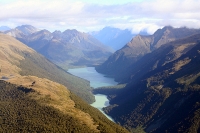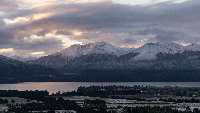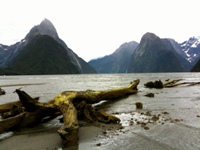Fjordland Travel Guide
The Fjordland region is the most dramatic and beautiful part of New Zealand, where waterfalls and misty forests, snow-clad mountains and towering granite peaks, crystal clear lakes, rivers and remote fjords make for a stunning holiday destination. The Fjordland National Park encompasses exquisite scenery and astounding natural splendour with some of the best walking tracks in the world. It's the largest national park in the country and stretches along the southwestern corner of South Island, with a jagged coastline indented by numerous sounds and inlets.
Milford Sound is one of the most visited and famous sights within the national park, and is a spectacular glacier-carved fjord with waterfalls plummeting down the sheer granite walls into the ocean below. The walks in the park are world famous and the greatest of these is the Milford Track, which is considered to be the finest walk on earth.
Fjordland National Park can be explored on foot, on a boat cruise, by sea-kayak or on a breathtaking scenic flight over the fjords, lakes and miles of ice and snow-covered mountains.
Things to do in Fjordland
The Fjordlands is where travellers can truly get up close and personal with the beautiful landscape that New Zealand has to offer. The region is renowned for its beautiful mountains, great lakes and spectacular waterways, all of which make it the spectacle it has come to be for tourists and locals alike. A great way to get around and see the best of what's on offer is to take a cruise, which can last from half a day to several nights. In this way travellers can see some of the most popular attractions such as Te Anau, but also experience some of the lesser-known attractions such as Lake Manapouri, which is smaller but just as pristine.
Known as the walking capital of the world, three of New Zealand's nine Great Walks are located in Fjordland. The Milford Track is New Zealand's most famous walk, which has been thrilling travellers for more than 100 years, but there are also many more famous trails such as the Kepler Track, which takes travellers through mountains, native forest, waterfalls, and glacier-carved valleys. The Routeburn Track is one of the shorter Great Walks, and links Mount Aspiring National Park with Fjordland National Park, showing off mountain peaks and jewel-like lakes along the way. And if all this hiking doesn't interest visitors, there are also many other attraction such as Jet Boating, guided cave tours and sea kayaking for them to enjoy while in the Fjordlands.

Fjordland National Park
Hemmed in by towering granite cliffs and dominated by Mitre Peak, the calm deep waters reflect ice-covered mountain tops, waterfalls plummet from the cliff tops to the water below, and Bottlenose dolphins play in the foaming wakes of the boats. The 14-mile (22km) long fjord of Milford Sound is the most famous attraction in the Fjordland National Park. The road to Milford Sound is one of the finest alpine drives in the world, and there are many view points to admire the sheer scale of the dramatic landscape. A variety of boat cruises or popular kayaking trips provide opportunities to see the fur seals, crested penguins and dolphins, while scenic flights give a unique perspective on the area.

Te Anau
Te Anau rests on the shores of the beautiful lake of the same name and has spectacular views of mountain peaks all around. It's the hub of the region and an excellent base from which to explore the Fjordland area. Te Anau has achieved the reputation of being the 'Sightseeing and Walking Capital of the World' as it offers easy access to some of the most splendid Great Walks and scenery. Lake Te Anau is the second largest in New Zealand, attracting visitors with a wide variety of water sports. The town also has a wonderful resource centre that provides information on tramping and other excursions, as well as offering aerial sightseeing or organising trips to the main attractions in the area.

Milford Track
The Milford Track is considered to be the finest walk in the world and has been attracting tourists and locals for over 100 years. Ending at Milford Sound, the four-day hike follows glaciated valleys and crosses an alpine pass. It traverses some fabulous scenery, past towering snow-clad peaks, along rivers and waterfalls, over grassy plateaux, and through dense rainforests. The number of hikers is limited and accommodation is provided in comfortable mountain huts along the way.
New Zealand travel info
Electricity
The electrical current is 230 volts, 50Hz. Oblique flat blade plugs are standard.
Language
The official languages in New Zealand are English, Maori and New Zealand Sign Language.
Money
The local currency is the New Zealand dollar (NZD), which is divided into 100 cents. Most businesses accept MasterCard and Visa and, while Diners Club and American Express are also widely accepted in the main tourist centres, they might have limited acceptance elsewhere. ATMs can be found in all towns and cities.
Tipping
Gratuities are not expected in New Zealand, but it's acceptable for guests to tip at their discretion.
Health
There are no health risks associated with travel to New Zealand. New Zealand's Accident Compensation Commission (ACC) covers emergency treatment for visitors, but health insurance is recommended to cover any additional charges and for those not entitled to free emergency treatment. Those intending to participate in adventure activities, such as bungee jumping, white water rafting should ensure that their travel insurance covers these types of activities.
Safety
New Zealand has a reputation as one of the safest destinations in the world, but sensible precautions against petty theft are still advised. Among them, travellers should avoid leaving possessions in unattended vehicles, even if they're out of sight, and they should use the hotel safe if possible.
Travellers who plan on swimming in coastal waters should be aware that riptides are common and can be dangerous, and that several drownings are reported every year. Sharks, seals and other wildlife present a risk to swimmers in certain areas. Travellers should avoid unsupervised beaches and at all times follow the instructions and warnings of lifeguards.
Adventure tourism, which includes zip-lining, rock climbing or trekking, can be dangerous, especially if activities are not well-organised. Enthusiasts should educate themselves on best practices for safety, and arrange activities through a tour operator that meets international standards.
Local customs
Though New Zealand has a strong reputation for tolerance towards homosexuality, there are still isolated incidents of homophobic related crime. LGBT travellers should be aware of local sensitivities, especially when visiting rural areas. Importing illegal drugs is punishable by up to 12 years' imprisonment.
Doing business
New Zealand is ranked first in the World Bank's Ease of Doing Business rankings. The business culture of New Zealand conforms to a typically British model: formal, reserved and conservative. However, this is tempered with a characteristically Antipodean warmth and friendliness, creating a relaxed, yet professional atmosphere.
Business etiquette in New Zealand will be familiar to those who've worked in western corporate environments before. Foreigners should use titles until instructed not to do so, and maintain eye contact when speaking to their associates. Business meetings should be scheduled at least a week in advance, and then confirmed a few days before they are due to take place. The dress code for business in New Zealand is usually formal. For meetings, men should stick to a dark suit, worn with a tie; women should wear a smart dress, business suit or pants suit, and limited accessories.
The official language of business in New Zealand is English, and business hours are generally from 8.30am (or 9am) to 5pm, Monday to Friday; and 9am to 12.30pm on Saturdays.
Duty free
Travellers to New Zealand over 18 years do not have to pay duty on 50 cigarettes, or 50g of cigars or tobacco, or a mixture of all three not exceeding 50g; three bottles of spirits or liqueur each containing not more than 1,125ml; 4.5 litres of wine or beer; and other goods to the value of NZD 700. Goods exceeding the allowances must be declared. Personal effects not dutiable include items such as jewellery, binoculars, portable radios, prams, camping equipment, cameras and video cameras. Prohibited items include concealed firearms, foodstuffs, animals, plants and plant products. It is forbidden to export Greenstone, Maori antiquities and Paua shells (unless they are products manufactured from such shells). Prescription medications need to be accompanied by a doctor's letter and the original prescription, they should not amount to more than three months worth of the medication.
Communications
The international access code for New Zealand is +64. The outgoing code is 00 followed by the relevant country code (e.g. 0061 for Australia). A good option is to purchase a local prepaid SIM card at the airport on arrival. Alternatively travellers use eSIMs if their cellular providers support it on their networks. WiFi access is widely available in hotels, restaurants and other tourist establishments, except in some of the more remote areas.
Passport & Visa
All foreign passengers to New Zealand must hold return or onward tickets, the necessary travel documentation for their next destination, and proof of sufficient funds to cover their expenses while in the country (usually NZD 1,000 per month, or NZD 400 if accommodation has been prepaid). All visitors must obtain a permit to enter Tokelau from the Tokelau Apia Liaison Office in Apia, at least two weeks prior to travel. It's highly recommended that travellers' passports have at least six months' validity remaining after the intended date of departure from their travel destination. Immigration officials often apply different rules to those stated by travel agents and official sources.
Entry requirements
US citizens must have a passport that is valid for at least three months beyond the date of departure from New Zealand. No visa is required for stays of up to three months. Travellers must have a New Zealand Electronic Travel Authority (NZeTA) obtained prior to boarding.
UK citizens must have a passport that is valid for at least three months beyond their date of departure from New Zealand. No visa is required for stays of up to six months. Travellers must have a New Zealand Electronic Travel Authority (NZeTA) obtained prior to boarding.
Canadian citizens must have a passport that is valid for at least three months beyond the date of departure from New Zealand. No visa is required for stays of up to three months. Canadians must have a New Zealand Electronic Travel Authority (NZeTA) obtained prior to boarding.
Australian citizens must have a passport that is valid upon their arrival in New Zealand. No visa is required. An NZeTA is not required.
South African citizens must have a passport that is valid for at least three months beyond the period of intended stay in New Zealand. South Africans require a visitor visa that must be organised prior to travel.
Irish citizens must have a passport that is valid for at least three months beyond the period of intended stay in New Zealand. No visa is required for stays of up to three months. They must have a New Zealand Electronic Travel Authority (NZeTA) obtained prior to boarding.
Useful contacts
Tourism New Zealand, Wellington:+64 4 462 8000 or www.tourismnewzealand.com
111 (All Emergencies)


